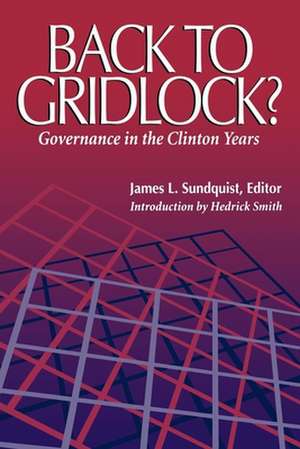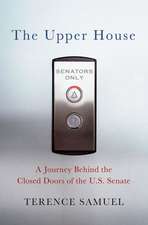Back to Gridlock?: Governance in the Clinton Years
Editat de James L. Sundquist Introducere de Hedrick Smithen Limba Engleză Paperback – noi 1995
As a result of the 1994 midterm election, the Republicans took control of both houses of Congress and divided government returned to Washington. Now, as the budget battles of 1995 clearly demonstrate, conflict between the parties is sending the government back to gridlock.
In this sequel to Beyond Gridlock?—a study published at the beginning of the Clinton administration, when government was in the hands of one political party—the contributors address this dilemma.
They begin by evaluating the effectiveness of the U.S. governmental system during the first two years of the Clinton administration, when both branches were controlled by a single party. They then move to a wider debate about the state of affairs in the American political system: what are the consequences of the Republican takeover of Congress, and will fundamental changes be required to make our system work effectively? Looking to the future, they outline the prospects for governance in the months and years to come.
In addition to the editor, the contributors are Howard H. Baker, Jr., Harold R. Bruno, Jr., Becky Cain, Lloyd N. Cutler, Thomas J. Downey, Kenneth M. Duberstein, Bill Frenzel, Charles O. Jones, Thomas E. Mann, Patricia McGinnis, Milton D. Morris, Kevin P. Phillips, Robert D. Reischauer, Donald L. Robinson, Robin Toner, and Vin Weber.
Copublished with the Committee on the Constitutional System
In this sequel to Beyond Gridlock?—a study published at the beginning of the Clinton administration, when government was in the hands of one political party—the contributors address this dilemma.
They begin by evaluating the effectiveness of the U.S. governmental system during the first two years of the Clinton administration, when both branches were controlled by a single party. They then move to a wider debate about the state of affairs in the American political system: what are the consequences of the Republican takeover of Congress, and will fundamental changes be required to make our system work effectively? Looking to the future, they outline the prospects for governance in the months and years to come.
In addition to the editor, the contributors are Howard H. Baker, Jr., Harold R. Bruno, Jr., Becky Cain, Lloyd N. Cutler, Thomas J. Downey, Kenneth M. Duberstein, Bill Frenzel, Charles O. Jones, Thomas E. Mann, Patricia McGinnis, Milton D. Morris, Kevin P. Phillips, Robert D. Reischauer, Donald L. Robinson, Robin Toner, and Vin Weber.
Copublished with the Committee on the Constitutional System
Preț: 155.67 lei
Nou
Puncte Express: 234
Preț estimativ în valută:
29.79€ • 32.46$ • 25.10£
29.79€ • 32.46$ • 25.10£
Carte tipărită la comandă
Livrare economică 23 aprilie-07 mai
Preluare comenzi: 021 569.72.76
Specificații
ISBN-13: 9780815782339
ISBN-10: 0815782330
Pagini: 128
Dimensiuni: 152 x 229 x 9 mm
Greutate: 0.19 kg
Editura: Brookings Institution Press
Colecția Brookings Institution Press
Locul publicării:United States
ISBN-10: 0815782330
Pagini: 128
Dimensiuni: 152 x 229 x 9 mm
Greutate: 0.19 kg
Editura: Brookings Institution Press
Colecția Brookings Institution Press
Locul publicării:United States
Notă biografică
James L. Sundquist is senior fellow emeritus in the Governmental Studies program at Brookings and the author of numerous books, including Constitutional Reform and Effective Government (Brookings, rev. ed., 1992). Hedrick Smith, a television producer since 1986, was a longtime reporter, editor, and bureau chief for The New York Times, and is the author of The Power Game: How Washington Works (Random House, 1988).
Descriere
As a result of the 1994 midterm election, the Republicans took control of both houses of Congress and divided government returned to Washington. Now, as the budget battles of 1995 clearly demonstrate, conflict between the parties is sending the government back to gridlock.
In this sequel to Beyond Gridlock?—a study published at the beginning of the Clinton administration, when government was in the hands of one political party—the contributors address this dilemma.
They begin by evaluating the effectiveness of the U.S. governmental system during the first two years of the Clinton administration, when both branches were controlled by a single party. They then move to a wider debate about the state of affairs in the American political system: what are the consequences of the Republican takeover of Congress, and will fundamental changes be required to make our system work effectively? Looking to the future, they outline the prospects for governance in the months and years to come.
In addition to the editor, the contributors are Howard H. Baker, Jr., Harold R. Bruno, Jr., Becky Cain, Lloyd N. Cutler, Thomas J. Downey, Kenneth M. Duberstein, Bill Frenzel, Charles O. Jones, Thomas E. Mann, Patricia McGinnis, Milton D. Morris, Kevin P. Phillips, Robert D. Reischauer, Donald L. Robinson, Robin Toner, and Vin Weber.
Copublished with the Committee on the Constitutional System
In this sequel to Beyond Gridlock?—a study published at the beginning of the Clinton administration, when government was in the hands of one political party—the contributors address this dilemma.
They begin by evaluating the effectiveness of the U.S. governmental system during the first two years of the Clinton administration, when both branches were controlled by a single party. They then move to a wider debate about the state of affairs in the American political system: what are the consequences of the Republican takeover of Congress, and will fundamental changes be required to make our system work effectively? Looking to the future, they outline the prospects for governance in the months and years to come.
In addition to the editor, the contributors are Howard H. Baker, Jr., Harold R. Bruno, Jr., Becky Cain, Lloyd N. Cutler, Thomas J. Downey, Kenneth M. Duberstein, Bill Frenzel, Charles O. Jones, Thomas E. Mann, Patricia McGinnis, Milton D. Morris, Kevin P. Phillips, Robert D. Reischauer, Donald L. Robinson, Robin Toner, and Vin Weber.
Copublished with the Committee on the Constitutional System











